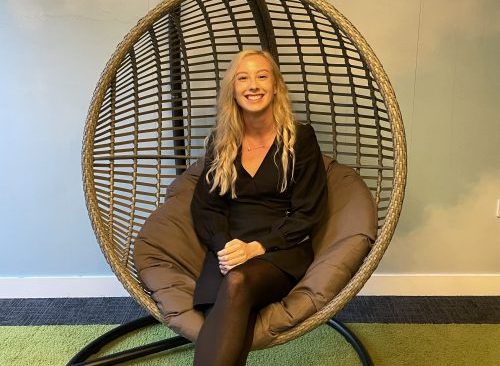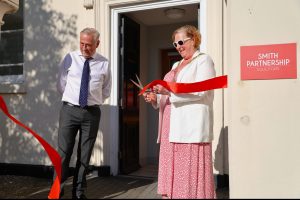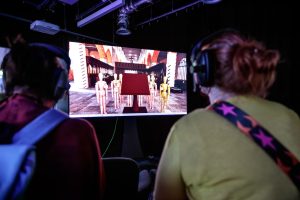Start-up founders ready to accelerate after testing times

Female start-up founders are optimistic about their prospects despite a tumultuous 18 months.
Speaking at the re-launch of NatWest’s Accelerator Hub event in Birmingham’s Brindleyplace, business owners shared their highlights and struggles and how they have been forced to adapt during the pandemic.
Maddie Booth launched Scrubbee in January, a range of coffee-based skincare products produced from up-cycling used coffee grounds sourced from Birmingham cafes.
The sustainable business was recently approached by a huge fast-fashion brand who wanted to stock Scrubbee’s products.
She said: “The core of everything I do is to be more sustainable. I had to say no, our values don’t align.”
The main challenge Booth says she has faced is having impostor syndrome in the business world and not knowing that others faced the same struggle.
She said: “I remember going to a networking event before lockdown and someone asked me to make them a cup of tea – and that was my first experience going into networking groups.
“Being a female in business, being a dyslexic person in business, and being someone with no business background, the biggest thing to do is just do things your way.”

From left to right: Enterprise accelerator manager Laura Foley was joined by senior NatWest colleagues John Maude, James Powell and Andrew Harrison
Booth has been supported by the NatWest Accelerator Programme. There are 11 hubs across the UK supporting more than 500 entrepreneurs with one opening at The University of Warwick, where Booth recently graduated from.
She said: “In the last two months we’ve grown the most we’ve ever grown. Looking at the new year and the new products we’re going to be up-cycling, I’m really excited. There’s so much potential.”
Ameesha Smith-Green set up The Book Shelf following a 12-year publishing career to help those who want to write and self-publish non-fiction books.

Ameesha Smith-Green, founder of The Book Shelf
But at the beginning of the pandemic many of The Book Shelf’s biggest contracts were cancelled.
Smith-Green said: “It was a really worrying time. I remember having calls with my accountant who said ‘I’m sorry but you’re just not eligible for any support’.
“As people started to be furloughed, many were being paid to be at home and not work. They thought ‘I’ve got a book in me, I have the time to write a book’ so it went from we’re not going to have any work to we’ve got way too much work.”
Like Booth, Smith-Green says coaching helped her to stop being a blocker in her own business.
She said: “NatWest helped me realise my own potential. I still had a freelance mindset of doing everything. I had to get out of that and understand how a business operates.”
Redditch entrepreneur Steph Middleton-Foster, who runs virtual assistant businesss Outhouse-UK, lost 95% of her business when the first lockdown was announced.

Steph Middleton-Foster, Configure Me This
She said: “I had 25 people working for me who were all freelancers and none of us had any government support. I had to use my savings that I’d put aside and I found any job that could be done by a virtual assistant to give to them. It got to the point where I was so close to going bankrupt.”
One part of Middleton-Foster’s business that did well through the pandemic was helping people to transition from in-person training to online, which she repackaged and launched as Configure Me This.
“The company helps small businesses to take ready made software, configure it to their own needs and integrate it altogether,” she added.
From spending so much time online, she is looking forward to using the hub’s co-working space. She said: “I’m so excited to get back into the hub. The primary reason I joined the accelerator was to come and meet more entrepreneurs.”
Andrew Harrison, head of business banking at NatWest, said: “Over the last 12 months, we have supported entrepreneurs on the program digitally and that’s been great. But it’s been fantastic getting everybody in the room and creating a buzz.
“Bringing people back into the room, and them starting to connect, I think this is an opportunity to create a really exciting space.”
The accelerator programme currently has a 51-49 gender split and and 38% of the entrepreneurs are black, asian and minority ethnic.
“We think that the more diverse the space, the better the ideas and the better the connections as well,” said Harrison. “We’ve been really clear that we have specific numbers of people from diverse backgrounds. I think Birmingham is a great example, it’s one of the most diverse cities in the UK.”
Miss Macaroon founder Rosie Ginday was part of the accelerator program in 2015.
Ginday trained as a high-end pastry chef at University College Birmingham and worked in Michelin-starred restaurant Purnell’s. She set up Miss Macaroon to create quality macaroons and to support young people with complex needs.
She said: “We reinvest 100% of our profits in supporting young people, they may be on the autistic spectrum, have mental health issues, have no parents, be ex-offenders or care leavers to help them build their skills and confidence.”
The pandemic forced Ginday to consider innovative ways to connect online, she said: “We were in a really good position to make the most of the increase in online sales. We had our best month out of our whole 10 year history last December.”
“Mental health needs tripled over the pandemic and we’ve seen that with our graduates and trainees who traditionally would have mental health issues but now they are more severe. We’re investing in more support so they can have a psychotherapist and counsellor on site.”









